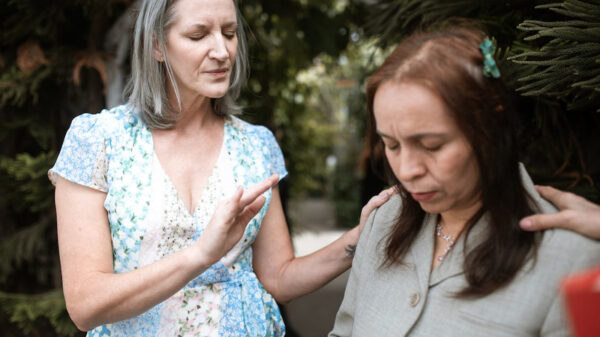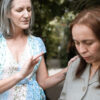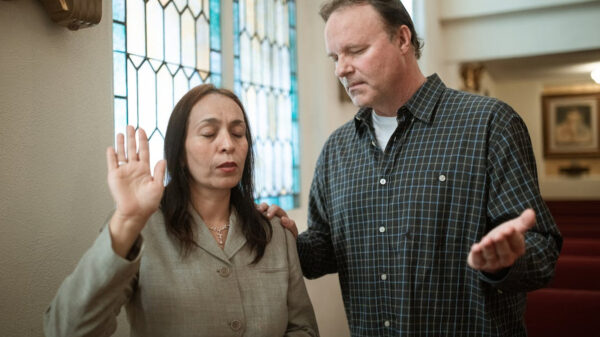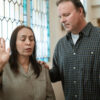
When I was growing up, my mom had a thick, imposing book called “Cults of the World” sitting on our living room shelf. I was fascinated by it, tentatively peeking at pages about Jehovah’s Witnesses and Christian Scientists when no one was looking. In my young world, you were a Christian or you belonged to one of these other religions; that was the choice. I don’t think I realized there were people who didn’t believe in God until I was in high school.
Today I marvel at how different the spiritual environment will be for my three young kids, in large part due to the availability and nature of the internet. While only about 6% of Americans identify themselves as atheist or agnostic, their collective voice is disproportionately loud online, given that the extreme positions on issues always come to the forefront of the internet. One need only look at comments under any news story with a religious touchpoint to witness a standard internet war of atheist/Christian worldviews.
As a Christian parenting blogger, I experience this firsthand. I don’t have people from the religions in my childhood “cults” book stopping by to engage in theological debates. I do, however, have atheists commenting almost every day. The more I personally experience the nature of internet atheism, the more I realize this is an aspect of our kids’ spiritual environment that we need to prepare them to engage with. They may only occasionally encounter vocal atheists in their personal lives, but they’ll almost certainly encounter atheists with regularity online – through social media posts/conversations, comments on news stories, blogs and more.
As I reflect on my experiences to date, I believe there are six key things kids need to understand before they face the online battle of worldviews.
1. Personal attacks need never be taken seriously.
A chart on my blog showing varying views of evolution and creation went viral to more than 26,000 people this summer after being shared amongst atheist groups. Comments such as, “I’m mortified that these ignorant creatures and I are of the same species” and “Poor woman, she is obviously in dire need of psychiatric care …” filled my blog’s Facebook page. Unfortunately, personal insults are par for the course online. Our kids need to know that shaming tactics need never be taken seriously. They are conversation enders, not starters, and say much more about the person using them than the person being attacked.
2. You can’t assume something is a fact just because someone states it as such.
A recent commenter on my blog’s Facebook page said, “There’s not a shred of evidence that Jesus actually ever existed.” That bold statement would sure sound like a “shocking fact” to a young person encountering it for the first time. In reality, however, very few scholars doubt that Jesus existed, and this was simply an inaccurate statement. It should be noted that just because we, as parents, state something as fact, doesn’t mean we should teach our kids to automatically take it as such either. We need to train our kids how to investigate truth claims on their own, regardless of where those claims originate.
3. False dichotomies are the bread and butter of overly simplified faith discussions.
False dichotomies – two views presented as opposites when they don’t need to be – abound in online faith discussions. After basic exposure to such conversations, it would be quite easy for a young person to assume they are facing a lifelong choice between faith and reason, science and faith, or evidence and faith. These misleading choices are often presented as the generally accepted bottom line, but in reality, Christians don’t need to make such tradeoffs. Biblical faith is not blind faith, as atheists so often portray it to be. We need to proactively teach our kids the biblical meaning of faith so they don’t fall into the trap of embracing a secular definition.
4. A person can quote the Bible without knowing anything about the Bible.
Atheists commonly mock the Bible as inaccurate, contradictory, disproven by science and lacking credibility because of its supernatural claims. It’s really very simple to pull verses from the Bible without context to support such a view point. Just as we need to teach our kids how to evaluate truth claims, we need to teach them how to study biblical passages in their appropriate context.
5. What passes for “common sense” has no bearing on truth.
Atheists often use emotion-based appeals to common sense to demonstrate “truth.” Doesn’t it defy common sense, for example, that miracles could have happened in a world governed by natural laws? Our kids need to understand that common sense often masquerades as the de facto guide to truth, but is actually a faulty compass. Truth is not always what makes the most sense in your subjective experience, what you think it would look like if you were to design it, or what you wish would be true. An individual’s common sense has no bearing on truth at all.
6. As Christians, we must remain motivated by love in our discussions.
Last month I received the following email from my blog’s contact form: “You are pathetic…I hope you and your family die painfully. Jesus never existed. Christians are the curse of this world.” It can be hard to react to hostility like this in love, but that is precisely what we are called to do. We need to teach our kids that we shouldn’t engage in dialogue to “win” for our own pride or glory; our words and approach should always be chosen carefully to glorify God.

J. Warner Wallace is a Dateline featured Cold-Case Detective, Senior Fellow at the Colson Center for Christian Worldview, Adj. Professor of Christian Apologetics at Talbot School of Theology, Biola University, author of Cold-Case Christianity, God’s Crime Scene, and Forensic Faith, and creator of the Case Makers Academy for kids.
Subscribe to J. Warner’s Daily Email
J. Warner Wallace is a Dateline featured cold-case homicide detective, popular national speaker and best-selling author. He continues to consult on cold-case investigations while serving as a Senior Fellow at the Colson Center for Christian Worldview. He is also an Adj. Professor of Christian Apologetics at Talbot School of Theology, Biola University, and a faculty member at Summit Ministries. He holds a BA in Design (from CSULB), an MA in Architecture (from UCLA), and an MA in Theological Studies (from Gateway Seminary).








































Pingback: Preparing Kids to Encounter Atheism Online
Pingback: “Preparing Kids to Encounter Atheism Online” | The Woodshed
Pingback: Anonymous
Pingback: SiftingPoint | Preparing Kids to Encounter Atheism Online
Pingback: Getting Started with Apologetics: How to Learn to Defend Your Faith
Pingback: Getting Started with Apologetics | A disciple's study
Pingback: A Case Study of a Christian Turned Atheist